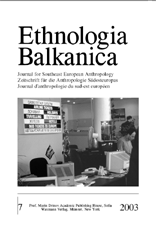Is Balkan Civil Society an Oxymoron? From Königsberg to Sarajevo, via Przemyśl
Is Balkan Civil Society an Oxymoron? From Königsberg to Sarajevo, via Przemyśl
Author(s): Chris HannSubject(s): Politics / Political Sciences
Published by: LIT Verlag
Keywords: Immanuel Kant and Civil Society; civil society as Western utopia; religion and civil society; solidarnoszcz; islam and civil society; orthodoxy and civil society;
Summary/Abstract: The efflorescence of civil society rhetoric all over Europe in the 1990s has been widely documented. Much of the inspiration came from east European “dissidents” such as Vacláv Havel in Prague and Adam Michnik in Warsaw. Yet there continues to be considerable uncertainty concerning the precise meaning of the term and how it can be investigated as an empirical reality It would be interesting to know more about the motivations, attitudes and values of the activists in these new organizations, both the local activists who mainly stay in one place (as Kant himself did), and those who are for ever on the move, the cosmopolitans that Kant fantasized, whom our age of globalization is arguably bringing closer to reality. But I want to suggest in this paper that too much attention has been paid to such organizations, in relation to their actual impact on the living conditions of the mass of the population. I find it especially dispiriting when PhD students in anthropology confine their projects to such formal bodies. While defensible as a practical means of entering the field, a focus on the NGO itself often limits the opportunities to illuminate the realities of local social life beyond the NGOs.
Journal: Ethnologia Balkanica
- Issue Year: 2003
- Issue No: 07
- Page Range: 63-78
- Page Count: 16
- Language: English
- Content File-PDF

